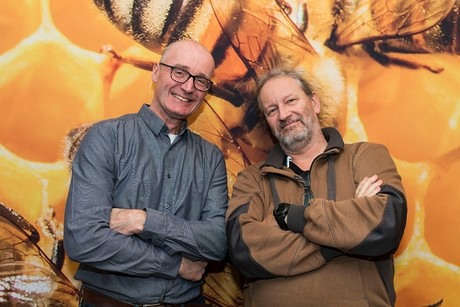To improve the health of bees and pollinating insects in general and to strive towards lasting sustainable pollination of crops, the colleagues of Van Hall Larenstein and Inholland join forces in the upcoming years in terms of practical research. The initiators of this project are lecturer Frens Pries and associate lecturer Arjen Strijkstra.

Lecturer Frens Pries (left) and associate lecturer Arjen Strijkstra (right)
The lectorate ‘Bee health’ at Van Hall Larenstein has been reinforced by lecturer Frens Pries and associate lecturer Arjen Strijkstra in the field of ‘Biodiversity and bees’ since January. Frens Pries has also been appointed lecturer of ‘Sustainable crop pollination’ at Inholland.
Pries and Strijkstra have known each other for a while within their field and look forward to their intensive cooperation. Pries: “The cooperation between our colleges with their own regional position and profile offers great potential and the research themes complete each other nicely. With this, we can deliver a great contribution to the National Bees strategy.”
Strive for a healthier insect landscape
According to Strijkstra and Pries, it is not only looking bad for (honey) bees, but there is also a massive decrease of all (pollinating) insects. This requires a more widespread approach. By combining the lecture about ‘Bee health’ with the research about ‘Sustainable pollination of crops’ Pries meets the research questions that arose from the beekeepers. Pries: “Professional beekeepers encounter big problems in regards to the health of bees, while the food supplies are mainly depended on the pollination done by honey bees. The choice to employ honey bees and to take care of a good environment for pollinating insects is an essential part of the pollination process.”
Recent insect research
“From Van Hall Larenstein we have been keeping busy with projects like the EU-Interreg project B-RAP from ‘Silence of the bees’ and, when already in close cooperation with the Inholland college, the Raak-PRO research project ‘Sustainable control of the varroa-mite in Dutch beekeeping,” so says Strijkstra. “Besides this, we are involved in many other projects, like KCNL-projects ‘Together for the bees’ and ‘Long term insect monitoring’, and the support of local companies and social organizations through ‘Silence of the Bees’ Bee pacts.”
At the college of Inholland, Priest has been researching viruses in bees and pesticides in honey and wax for the last couple of years, a CoE Food project in cooperation with the Bijkers guild.
Strijkstra: “By widening the scope of our research we can now aim towards the improvement of the landscape for all insects, including bees and honeybees.” Pries strengthens this statement with the following: “We are going to work more closely together with landscape researchers at Inholland Delft and other colleges.”
